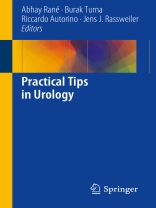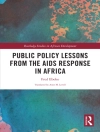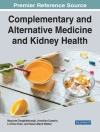Practical Tips in Urology is a compact, illustrated reference which provides the reader with practical tips and advice in managing day-to-day urological issues encountered in a clinical setting. This book draws on practical experience and offers useful information that is often lacking in didactic textbooks of urology and in journal articles. Practical Tips in Urology provides tips in dealing with urological emergencies, elective surgery and common outpatient consultation problems, among other things. Written by experts in the field, Practical Tips in Urology is key reading for all practicing urologists and residents in training.
Mục lục
Chapter 1. Diagnostic Algorithms for Haematuria
Chapter 2. Hydronephrosis in Pregnancy
Chapter 3. Practical Interpretation and Application of Urodynamic Findings
Chapter 4. Practical Interpretation of CT Findings for the Urologist
Chapter 5. What Should Urologists Ask the Radiologist?
Chapter 6. Tips for Managing Acute Iatrogenic Ureteric Injury
Chapter 7. Chronic Prostatitis: A Practical Approach to Treatment
Chapter 8. How Do I Manage the Septic Urologic Patient?
Chapter 9. Practical Functional Evaluation of Adrenal Mass
Chapter 10. Interstitial Cystitis: Practical Recommendations for Treatment
Chapter 11. Optimal Use of Antibiotics in Urology
Chapter 12. Difficult Urethral Catheterization
Chapter 13. Management of Acute Urinary Retention
Chapter 14. Congenital Anomalies in Adults: Diagnosis and Management Considerations
Chapter 15. How Do I Get a Perfect Cosmetic Result After Circumcision?
Chapter 16 – Technical Tips for Varicocelectomy
Chapter 17. Optimum Use of Second-Line Treatment Options for Erectile Dysfunction
Chapter 18. Management of Recurrent Urethral Strictures
Chapter 19. Management of Severe Hemorrhagic Cystitis
Chapter 20. Penile Rehabilitation After Radical Pelvic Surgery
Chapter 21. Tips for Intravesical Chemotherapy and Immunotherapy
Chapter 22. Stone Analysis
Chapter 23. Advice to the Families of the Pediatric Stone Former
Chapter 24. General Advice on Recurrent Stone Former
Chapter 25. Lifetime Advice to Patients After Urinary Diversion
Chapter 26. Lifestyle Advice for Sub-Fertile Men
Chapter 27.
Chapter 28. Transrectal Ultrasound-Guided Prostate Biopsy
Chapter 29. Transperineal Prostate B iopsy
Chapter 30. Tips for Open Renal Surgery
Chapter 31. Tips for Open Surgical Approach to Pelvis for Urologic Surgery
Chapter 32. How and When Do I Need to Perform an Exploratory Laparotomy After Major Urological Surgery?
Chapter 33. How Do I Become a Surgeon Scientist?
Chapter 34. How Do I Publish a Scientific Urological Paper?
SECTION 2. ENDOUROLOGY
Chapter 35. How Do I Set Up a Stone Clinic?
Chapter 36. How Does Shock Wave Break Stones?
Chapter 37. Which Lithotriptor Should I Buy?
Chapter 38. How Should I Operate on a Lithotriptor for Optimum Results?
Chapter 39. Tips and Tricks of Rigid Ureteroscopy
Chapter 40. Tips for Flexible Ureteroscopy
Chapter 41. Technical Tips for Laser Lithotripsy Chapter 42. Tips and Tricks for Difficult Ureteral JJ Stent Insertion
Chapter 43. Tips to Puncture the Kidney Using the Triangular Technique s
Chapter 44. Tips for Puncturing the Kidney Using the “Bull’s Eye” Technique
Chapter 45. Tips to Puncture the Kidney Using Ultrasound
Chapter 46. Tips to Enter the Pelvicalyceal System in the Supine Position
Chapter 47. Tips for Mini and Micro PCNL
Chapter 48. Use of Laser in Urology
Chapter 49. TUR-P
Chapter 50. How to Perform a Good TURP
Chapter 51. Management of Postoperative Complications Following TURP
Chapter 52. How to Perform A Good TURBT
SECTION 3 – LAPAROSCOPIC AND ROBOTIC SURGERY
Chapter 53. Starting a Robotic Surgery Program
Chapter 54. Tips for Education in Laparoscopy
Chapter 55. Tips in Anesthesia for Robotic Surgery
Chapter 56. Patient Positioning For Robotic Pelvic Surgery
Chapter 57. What Is The Best Port Placement for Urologic Laparoscopy?
Chapter 58. What Is the Best Port Placement for Urologic Robotic Surgery?
Chapter 59. How Do You Manage Gas Leak During Laparoscopy?
Chapter 60. Management of Bleeding During Laparoscopy
Chapter 61. Transperitoneal Laparoscopic Radical Nefrectomy: Tips for Challenging Cases
Chapter 62. Tips for Safe and Quick Transperitoneal Laparoscopic Nephrectomy
Chapter 63. The Single Knot Running Vesico-Urethral Anastomosis
Chapter 64. Tips and Tricks for Erectile Function Preservation During Robot-Assisted Radical Prostatectomy
Chapter 65. Tips to Preserve Continence During Robotic Radical Prostatectomy
Chapter 66. Radical Prostatectomy for Locally Advanced Prostate Cancer
Chapter 67. Practical Solutions for Challenging Robotic Prostatectomy Cases
Chapter 68. Robotic Radical Cystectomy and Urinary Diversions: Step-By-Step Technique
Chapter 69. Tips For Ideal Urinary Diversion
Chapter 70. Robotic and Laparoscopic Anderson-Hynes Dismembered Pyeloplasty: A Practical Approach
Chapter 71. Renal Reconstruction Techniques For Renal Tumours In Various Locations
Chapter 72. Use of Surgical Navigation During Urologic Surgery
Chapter 73. Nuances of Extraperitoneal LaparoscopyGiới thiệu về tác giả
Professor Abhay Rane
Prof. Rane was appointed an Officer of the Order of the British Empire in the New Year 2014 Honours List for services to laparoscopic surgery.
He is one of the first laparoscopic urological surgeons in the United Kingdom. Instrumental in developing the technique of hand assisted laparoscopic nephrectomy in the UK from 2000, he was the first to described the usefulness of the technique in T3b (advanced) kidney cancers. More recently, hespearheaded the development of laparoendoscopic single site surgery (LESS) in urology as a pioneer and innovator. Having performed the first single port nephrectomy in the world in May 2007 with colleagues in India, he went on to perform the first LESS nephrectomy in Europe in March 2008 at East Surrey Hospital, Redhill. He has been invited to share his experiences at a number of sessions at various cross specialty international meetings, including the American Urological Association and Society of American Gastrointestinal and Endoscopic Surgeons (2009 /10), where he was the only urologist to be invited faculty.Over the last thirteen years, Professor Rane has mentored laparoscopic skills to other consultants. As a result, of his efforts at least 16 hospitals in the UK now have a local laparoscopic urology programme; his work on training in laparoscopy has been presented, published and cited extensively.
Professor Rane has been a Consultant Urological Surgeon at Surrey and Sussex NHS Trust for the last 14 years, where he is currently Clinical Lead for urology.
Doctor Burak Turna
Dr. Turna is the Associate Professor of Urology at Ege University School of Medicine, Izmir, Turkey, one of the largest academic institutions in the country. He has several teaching assignments, including his current faculty appointment with the Department of Urology in Ege University as well as the Chair of the Executive Board of the surgical internship for Urogenital Surgery for fourth year medical students.
Dr. Turna is a nationally recognized leader in the field of endourology and laparoscopic surgery. He has been extensively involved in the Turkish Endourology Society’s scientific and educational activities as a surgeon/trainer/speaker and is currently the Associate Editor of the Endourology Bulletin, the official Journal of Turkish Endourology Society. As the general secretary, Dr Turna, has also been involved in the organisation and execution of the two big laparoscopy meetings held in Turkey in 2005 & 2009.
Dr. Turna acted as a speaker/moderator/trainer and has performed live surgery demonstrations in several national and international endourology meetings to date. He has most recently been selected as an Associate for the “European Society of Uro-technology” Endourology Expert Group in 2010.












